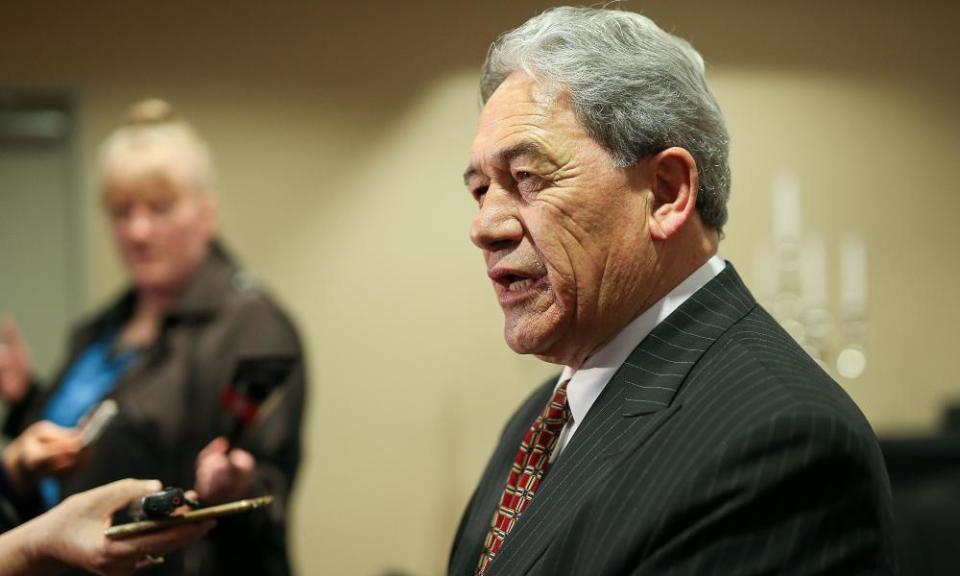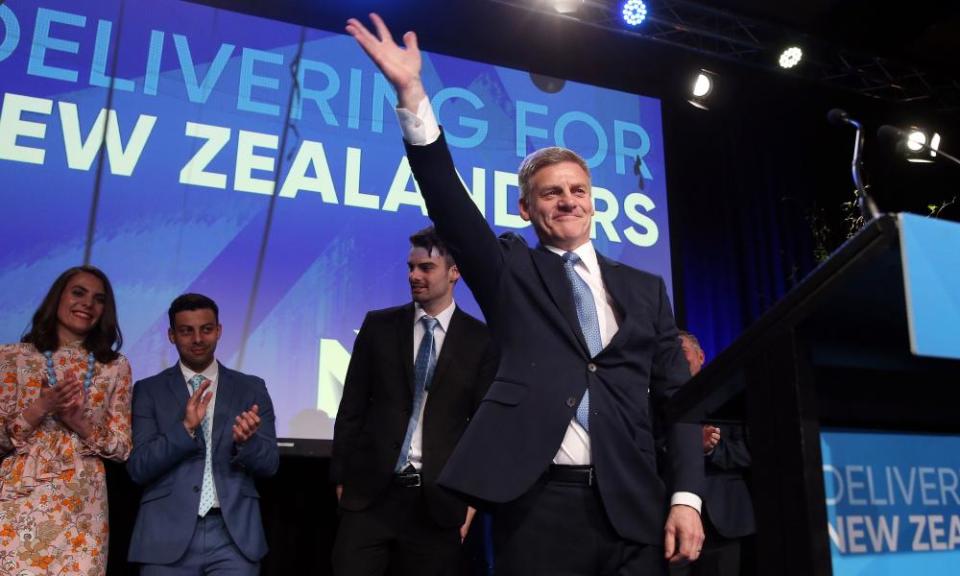New Zealand gets hung parliament as Jacinda Ardern falls short in election
The future of New Zealand’s new government has been put in the hands of Winston Peters, a cantankerous, anti-immigration politician who prefers fishing to politics, after vote counting finished in the general election.
Neither of the major parties – National, led by the incumbent prime minister, Bill English, or Jacinda Ardern’s Labour – secured enough seats to form a majority government in a frustrating poll on Saturday. National secured 46% of the vote, giving it 58 seats in parliament, while Labour took home 35.8% and 45 seats.
Both parties were scrambling to form coalitions with the minor parties in order to reach 61 seats and the ability to govern in the 120-seat parliament.
Peters, the unpredictable leader of the populist New Zealand First party, became kingmaker after gaining 7.5% of the vote and nine seats, although not his own seat of Northland. The 72-year-old lawyer made a teasing statement to the media about his intentions before rushing to board the last ferry home on Saturday night.
“As it stands I believe we hold the balance of responsibility and we are not going to be hasty with that and we are not going to rush out and make a decision tonight,” said Peters, speaking from the pub in Russell where he held his election party, hundreds of kilometres north of Auckland, where the major parties were staging their events.
“I will not make a decision tonight or tomorrow until I have talked to all of New Zealand First … that will take us some time.We invite you to be patient: don’t ask us who we are going to go with.”

In their own election night speeches, English and Ardern immediately started courting Peters, with the latter making explicit references to Labour policies that would appeal to Peters, such as pulling more New Zealanders out of poverty. Labour has already pledged to cut immigration by up to 30,000 if it forms the next government.
“When it comes to any conversations about potential future governments, that’s a conversation for tomorrow,” said Ardern, from a packed Labour HQ in Aotea Square, Auckland, where she was mobbed by supporters.
“There are special votes to come … I’m hopeful that we’ll see a little bit of a lift. I’ll certainly reach out [to Peters] tomorrow. We’ll all be working to resolve this as quickly as we can.”
English said he was in a strong position to negotiate, as National needed only three or four more seats to form a government, while Labour needed the support of both the Greens – who are set to take seven seats – and NZ First.
“We negotiate from a pretty strong position, a pretty good endorsement from the public,” English said.
“The voters of New Zealand have given New Zealand First a role in forming the next government. In the next few days we will begin discussions with NZ First finding common ground and most importantly taking on the responsibility of forming the kind of government that will enable New Zealand to get on with the job of success – a strong and stable government for all New Zealanders.”

The official election results – including special votes, such as those cast overseas and by people outside their home constituency – will not be known for two weeks. It is not out of the question that negotiations between Peters and the major parties could continue until the second week of October.
NZ First has previously worked with both major parties, entering into a coalition with National after the 1996 election, with Peters serving as deputy prime minister, and forming a confidence-and-supply agreement with Labour in 2005, which saw him appointed foreign minister.
But he is a controversial figure in New Zealand politics. In 1996 he campaigned to close borders to what he called the “Asian invasion”, and since then he has continued to call for a crackdown on immigration, which he says is the cause of New Zealand’s housing and social problems.
To move towards 61 seats, National can count on the support of David Seymour, the sole MP elected for ACT, a rightwing libertarian party. But another National ally, the Māori party, faced electoral wipeout, failing to meet the threshold to win a place in parliament, and losing the seats of its two co-leaders, Te Ururoa Flavel and Marama Fox.
default
This election has been the mostly tightly contested in years, with the two major parties trading polling leads in the run-up to voting day. A record number of early votes, 1.2m, were cast ahead of Saturday.
On the night, National took an early lead. By 8pm that had solidified, with predictions showing no way for Labour to form a government with the help of its usual ally, the Green party.
The campaign drew attention to a growing conflict of interest between old and young New Zealand, with English promising to keep the country the same and Ardern campaigning on a message of change, saying young people had been priced out of the housing market and lumped with hefty student debts.
Two months ago the outcome of the election was looking pre-determined, with National expecting to be returned comfortably for a fourth term.
Labour’s Andrew Little had failed to connect with voters, and on 1 August he stepped down as leader, nominating his 37-year-old deputy, Ardern, to take his place – although she had previously said she had no interest in the job.
Within days, Ardern’s campaign of “relentless positivity” set the political landscape on fire. Labour soared in the polls, climbing 20 points to overtake National, with Ardern ahead of English as preferred prime minister. However, as voting day neared, opinion polls shifted back to National.
The last weeks of the campaign carried a whiff of ugliness, with Labour accusing National of scaremongering and lies after it claimed there was an NZ$11.7bn (AU$10.7bn/£6.3bn) black hole in Labour’s fiscal plan – an allegation that was not backed by a single economist but was repeated relentlessly by English.
English, a former farmer, was viewed by many voters as a safe pair of hands to steer New Zealand through a period of global turbulence. He will now face the prospect of doing so while balancing the demands of a rather less predictable party leader.

 Yahoo News
Yahoo News 
